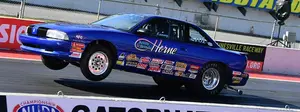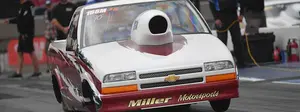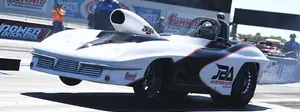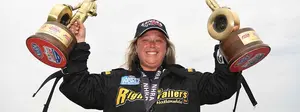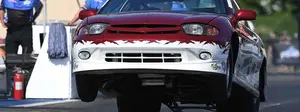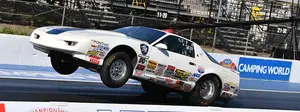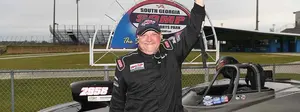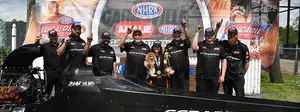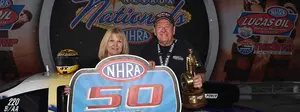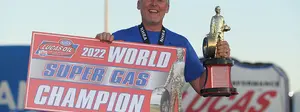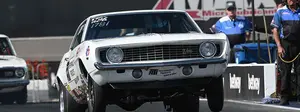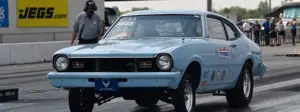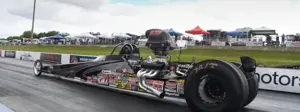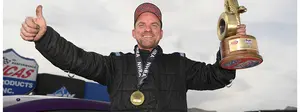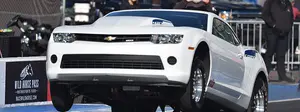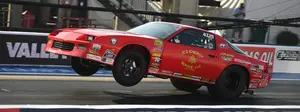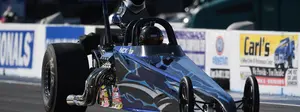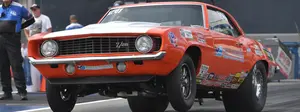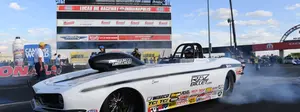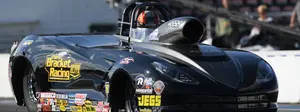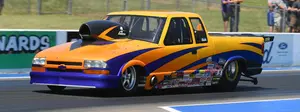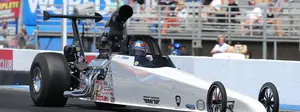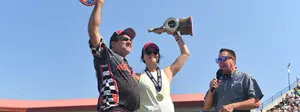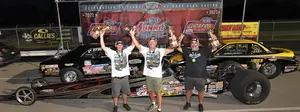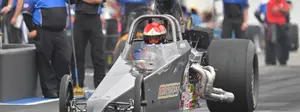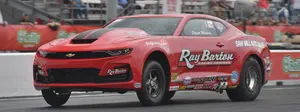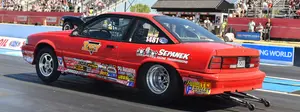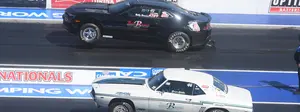In defense of bracket racers
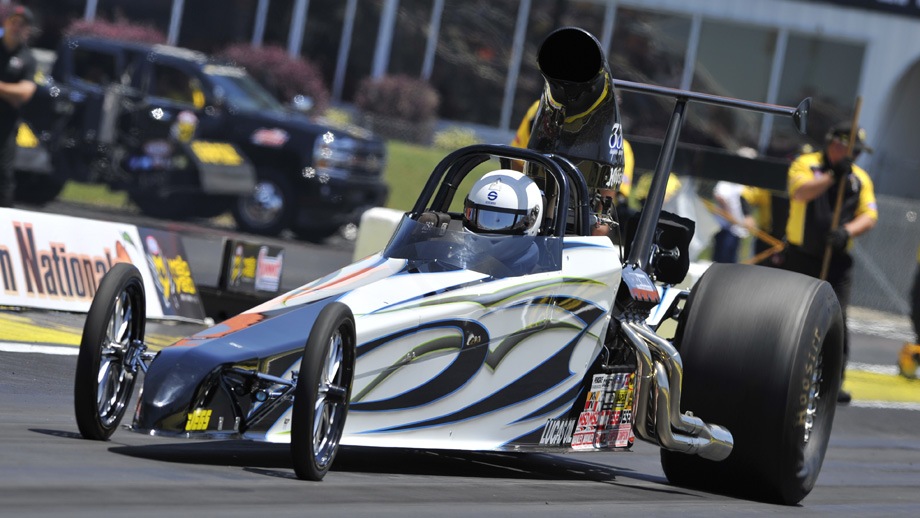
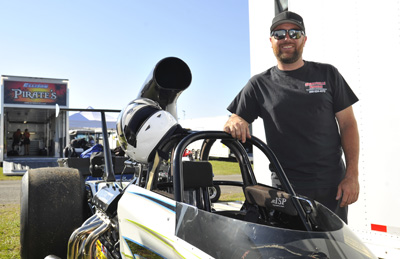 There are those who think that E.T. bracket racing is easy or that bracket racers are somehow inferior to those racers who compete in heads-up or performance-based classes. People with that mindset are sadly mistaken.
There are those who think that E.T. bracket racing is easy or that bracket racers are somehow inferior to those racers who compete in heads-up or performance-based classes. People with that mindset are sadly mistaken.
Bracket racing, where vehicles of differing performance levels are equalized using a handicap start and a breakout rule, is a hugely popular endeavor featured at almost every dragstrip in the country. There is a good reason for that. In bracket racing, budgets are practically irrelevant. A fast car is also not a requirement. What is required to be successful in bracket racing is a fair amount of driving savvy; including, but not limited to, the ability to leave the starting line on time, and make wise decisions down track. To paraphrase an old poker adage, bracket racing takes a few minutes to learn and a lifetime to master.
One individual who may well have learned the hard way not to disparage E.T. bracket racers is James “Birdman” Finney. A heads-up and grudge racer who has been featured on the popular Street Outlaws television program, Finney ignited a firestorm a couple of weeks ago with a post on the Drag Coverage Facebook page where he suggested that bracket racing was merely a training ground for “real” racers and that bracket racers were somehow inferior to racers in other forms of straight-line competition.
Here is the text of Finney’s post:
“[I] never said [bracket racers] weren’t talented. Just said they were not really racers. And again, I agree that bracket racing is a good way to start out a “REAL” racing career. I had training wheels on my bicycle when I was three but they eventually had to come off. Until these bracket racers take the training wheels off then they will continue to be compared to synchronized swimmers….a sport yes…competitors not so much.”
It doesn’t take much imagination to understand why a host of dedicated bracket racers and sportsman drivers might take exception to Finney’s comments. While bracket racing is often used as a stepping stone to faster classes and different forms of drag racing, the fact is that many bracket racers are perfectly content to stay right where they are.
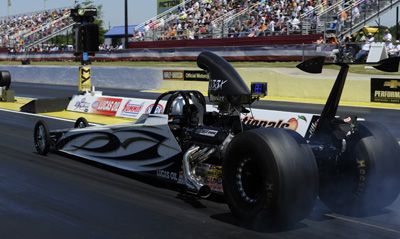 One driver who was quick to jump in and defend the E.T. racing clan is Shawn Langdon. Known to many NHRA fans as the 2013 Mello Yello Series Top Fuel champ, Langdon’s extensive résumé’ also includes a pair of Lucas Oil Series titles in the Super Comp class as well as a championship in the NHRA Jr. Drag Racing League. Langdon has also won his fair share of big E.T. bracket races and he continues to bracket race his Super Comp dragster whenever time permits. From Jr. Dragsters to Top Fuel, if you’re looking for someone who has seen the sport from almost every angle, Langdon is your guy.
One driver who was quick to jump in and defend the E.T. racing clan is Shawn Langdon. Known to many NHRA fans as the 2013 Mello Yello Series Top Fuel champ, Langdon’s extensive résumé’ also includes a pair of Lucas Oil Series titles in the Super Comp class as well as a championship in the NHRA Jr. Drag Racing League. Langdon has also won his fair share of big E.T. bracket races and he continues to bracket race his Super Comp dragster whenever time permits. From Jr. Dragsters to Top Fuel, if you’re looking for someone who has seen the sport from almost every angle, Langdon is your guy.
“I don’t know Birdman personally but one day I was checking out my social media stuff and I came across that post and decided to respond,” said Langdon. “The things he said about training wheels and not being a real sport sort of grabbed my attention. He was belittling the bracket racing community and I felt like I needed to say something.
“Being in the position I’m in, looking for funding to get back out there and race in Top Fuel, I try not to get too political. I’m not a negative person at all,” Langdon said. “In fact, I love all forms of drag racing and I respect anyone who has the same passion for this sport that I do. I just felt like, in this instance, I could be a voice for the voiceless because I can tell you that what he wrote about bracket racers simply isn’t true. To say that bracket racers aren’t ‘competitors’ is crazy. I guess he feels that way because his car is quicker than most bracket cars but that’s not what this is about.”
Langdon responded publicly to Finney’s comments on Facebook and even went so far as to post his career-best 3.662-second time-slip from the DSR Red Fuel dragster with the following note: “Hey Birdman I've heard your car has put up some cute numbers before. Speaking of throttle stops when you takin yours off?
Sincerely, An aspiring non-competitive, synchronized swimming bracket racer
Langdon went on to note that he wasn’t trying to insult Finney, or add fuel to an already blazing twitter battle between bracket racers and the street/grudge crowd. He was merely trying to make Finney understand that performance doesn’t or shouldn’t define a racer’s social status.
“I’ve driven just about everything there is to drive in drag racing except for maybe the no prep Street Outlaws type stuff,” said Langdon. “I do, however, keep an eye on those cars because my crew chief [Phil Shuler] owns and tunes the car that Stevie Fast [Jackson] drives. Phil keeps me in the loop and I try to check out those cars whenever I can. Racing is racing and to me it doesn’t matter; I love all of it.
“I will also say this; strictly from a driving perspective, bracket racing is the hardest thing I’ve ever done. I mean, it takes talent to drive any kind of a race car. That’s especially true in Top Fuel. I’ve had some success there but I still learn every time I go down the track and I have a ton of respect for anyone who gets in a [nitro car] and has any kind of success. At the same time, bracket racing requires a whole different level of precision. To do the same exact thing for eight to 10 rounds and not make a mistake is hard. A .020 light in bracket racing won’t cut it. You have to be better than that. And then, you have to judge the finish line to within a thousandth of a second. That is hard to do in any sort of a car.”
Langdon also noted that while his 300-mph runs in a Top Fuel dragster have helped to make him a better bracket racer, the reverse is also true. The seat time he gets while bracket racing, and the attention to detail required for success, has helped him become a better nitro racer.
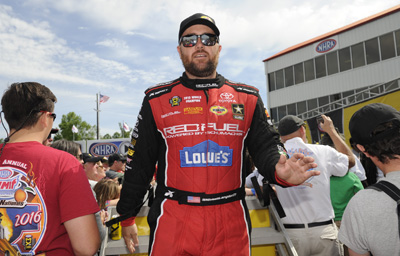 “I’ve always said that you can make an excellent pro racer out of a quality sportsman racer but if you take someone who has no sportsman experience and put them in a pro car, it’s going to take them a lot longer to adapt,” he said. “Racing in all those sportsman categories gave me fundamentals of how to drive a race car. When I got a chance to get in a Top Fuel dragster, it was just a matter of seat time. It was just a matter of getting adjusted to the incredible speed. Don’t misunderstand me; nothing can compare to a Top Fuel car. It takes extreme talent to do it, but I’m just saying that my sportsman background helped make the transition easier than it could have been.”
“I’ve always said that you can make an excellent pro racer out of a quality sportsman racer but if you take someone who has no sportsman experience and put them in a pro car, it’s going to take them a lot longer to adapt,” he said. “Racing in all those sportsman categories gave me fundamentals of how to drive a race car. When I got a chance to get in a Top Fuel dragster, it was just a matter of seat time. It was just a matter of getting adjusted to the incredible speed. Don’t misunderstand me; nothing can compare to a Top Fuel car. It takes extreme talent to do it, but I’m just saying that my sportsman background helped make the transition easier than it could have been.”
Langdon’s final comments on the whole debate reflect the thoughts of many bracket racers, including those who aspire to race in quicker categories and those who are content to race at their current level.
“It doesn’t matter what or where you race,” Langdon said. “Everywhere I go, I see people who have a passion for sport. That’s important. When you look at the big picture, budget doesn’t matter. Most of the people I know put their heart and soul into their racing weather it’s a $10,000 bracket car or a multi-million dollar professional operation. The people I know give it all they’ve got. I just don’t want to see anyone get belittled just because they’re racing within their means. Bracket racing matters because it is the core of the sport. It matters because that’s how we get young people involved and keep them out of trouble. No one should feel inferior just because they bracket race. We’re all a part of the same family.”


